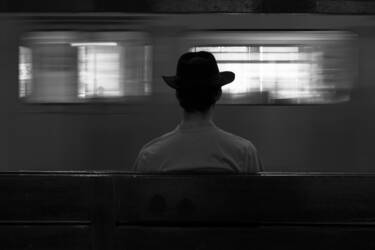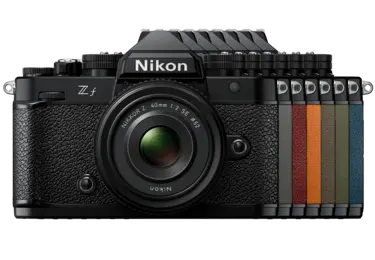Standing the Test of Time with the Nikon Z f – part one

We tasked six photographers across Europe to use the Nikon Z f’s new monochrome features, creating a photo series that evokes timelessness – the results are now in
In a world full of colour, why turn to black and white? For our photographers, monochrome enhances storytelling, evokes different perspectives and heightens emotions. Equipped with the new Nikon Z f, our six photographers travel Europe and use light, space and depth to take their viewers on a journey through time.
In the first part of this two-part series, we speak to urban street photographer Maximilian Streich, travel and architecture photographer Helin Bereket, and beauty and self-portraiture Johanna Herrstedt. For part two with Ben Moore, Theo Gosselin and Maud Chalard read here.
Nikon Team

Maximilian Streich, urban street photography
Berlin, Germany
Why is it important to shoot in ‘timeless’ black and white?
A street photograph, especially when captured in black and white, is a skilful medium for shaping the reality of the viewer. In street photography, the photographer’s eye is particularly decisive in determining which section of reality they capture. By condensing reality and focusing on details, especially in black and white, the photographer can decide whether they want to give the viewer a contemporary insight into 2023 or whether they want to transport the viewer back 100 years.
How did you find the new Nikon Z f?
The Nikon Z 7II has always been my go-to full-frame camera. Plus, I frequently use the Z fc – I love the compact body and the analogue settings, useful in my daily work in the streets of Berlin and around the world. For me, the Nikon Z f now takes this compactness to a new technical level. The autofocus, full display and the compact retro design are the key advantages and, especially with a compact lens like the NIKKOR Z 40mm f/2, I can fade into the urban environment much more easily as a participant observer, unobtrusively documenting unposed scenes and moments that define my photography. The analogue setting options also enable me to keep an eye on my settings even faster, without a display, and to be able to adjust them in a blink of an eye, if necessary.
How did you find the Z f’s new monochrome features?
It can be a great challenge to capture our colourful world and only have an idea of what the final image might look like in black and white. The monochrome feature solves this difficulty with unprecedented simplicity and ease of use. I can set my ‘perception’ to black and white with a single button movement and then concentrate fully on my composition, the subject, the shooting itself, without having to covert to black and white in my imagination, because I can already see the result with all the settings in the viewfinder or display.
How does your composition differ in black and white from colour?
Since colour, which is a central component of my photography, does not factor into black-and-white photography, I focus on the interplay of shapes, lines and textures. The interaction of light and shadow, which is another essential part of my photographic work, is emphasised even more through black and white. Capturing photographs with very high contrast can thus take on a new dimension of abstractness or playfulness and boost my creativity.
What do you ultimately set out to achieve with your black-and-white photography (that you may not do in colour?)
Black-and-white photography creates a sense of simplicity, while also enhancing storytelling by removing distractions and emphasising narrative elements. The interaction of colours doesn’t need to be considered, therefore, and I can bring image elements that may not fit together in colour and emphasise lines, shapes and structures. High-contrast black-and-white images can create a sense of drama, moodiness and intensity, which in turn corresponds to the mood I try to convey in numerous shots in my portfolio.
Johanna Herrstedt, beauty and self-portrait photography
Stockholm, Sweden
What does black-and-white photography evoke to you?
Black and white evokes nostalgia and emotions. Without the distraction of colour, you are forced to look at the story the photography is telling. It’s a moment to sit down and reminisce. I love that!
What was your experience using the Z f?
I was hesitant to start using it because I had worked up an idea that it would be too tricky. But, I was pleasantly surprised with how easy it was to manoeuvre and the results. Do I dare say it’s beginner friendly? I’ve had a blast shooting with the Z f! The new monochrome features were very easy to access and use. The ‘monochrome’ and ‘deep tone monochrome’ are my favourites of the three monochrome profiles. They give roughly the same result as if I were to manually edit a colour photograph to black and white.
Is your composition different shooting in colour compared to black and white? What do you look out for?
Some details are lost in translation when going from colour to black and white. Though the way I shoot is not wildly different, I do pay more attention in black and white to creating harsh or soft shadows and playing with light to give my photos a depth and dimension that is more expressive.
What do you set out to achieve with your black-and-white photography?
Short answer: contrast and emotions. I want to isolate the subject so it doesn’t melt into the surroundings. It doesn’t have to be a harsh contrast, but enough so you know where to look and what you’re looking at. I want the photographs to tell a story, and sometimes I want the viewer to interpret their own. Art is subjective and it’s an opportunity to take advantage of that.
Helin Bereket, self-portrait photography
Berlin, Germany
Tell us about your experience with the Nikon Z f. How did it compare to your previous kit?
The design is the biggest difference. Holding the Z f in your hand feels completely different to any other full-frame camera – it’s definitely the winner when it comes to looks! The brass dials on the top not only look good but are also very useful for easily changing settings. The Z f also has amazing autofocus performance. Even with the SnapBridge app I use for self-portraits, it works great, and the fully articulating LCD screen is incredibly useful, as you can capture any angle without having to bend down.
How did you find the new monochrome features on the Z f?
This series was planned to be monochrome, but I also wanted to shoot it in colour because I was curious to see what the photos would look like in colour. It was very convenient to switch between monochrome and colour with a single button. Also, with three different monochrome features to choose from, you can get perfect black-and-white creativity straight out of the camera. It’s a must have for every photographer who enjoys black and white.
Is your composition different shooting in colour compared to black and white?
It was very exciting for me to photograph in black and white because colour is my usual playground. It was a real challenge, even a bit scary at the beginning! Especially when adjusting the light on a sunny day in a minimalist environment, there is a high risk of ending up with overexposed images because the difference between white colour and white light can hardly be separated. The Nikon Z f mastered it very well. I tried to create a ‘bold’ self-portrait series that attracts attention at first glance. My photos are usually very location-dominated, and the people are smaller. In this series, I dared to get closer to my subject, i.e. myself, in order to make the photos a little fuller and the lack of colours as obscure as possible.
What do you ultimately set out to achieve with your black-and-white photography (that you may not do in colour?)
When colours are missing, the composition, light and content suddenly become very important. Shooting black and white taught me a lot about light and composition. Even though I gave up colour for this project, I wanted to preserve my minimal style, and my biggest fear was that minimalist black-and-white photographs would be perceived as boring in a series where the colour dimension is missing. I tried to cover the lack of colours with content and with the character I transformed myself into.
You can read part two of the introductions and results of our six photographers here.
Discover the full-frame Nikon Z f
Featured products
More from our creators
Travel and architecture photography 101 with Helin Bereket

For limitless creativity










